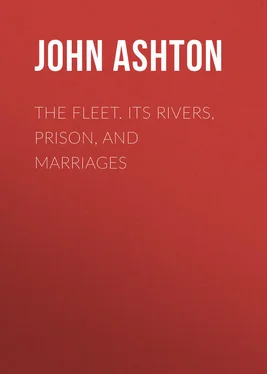John Ashton - The Fleet. Its Rivers, Prison, and Marriages
Здесь есть возможность читать онлайн «John Ashton - The Fleet. Its Rivers, Prison, and Marriages» — ознакомительный отрывок электронной книги совершенно бесплатно, а после прочтения отрывка купить полную версию. В некоторых случаях можно слушать аудио, скачать через торрент в формате fb2 и присутствует краткое содержание. Жанр: foreign_antique, foreign_prose, на английском языке. Описание произведения, (предисловие) а так же отзывы посетителей доступны на портале библиотеки ЛибКат.
- Название:The Fleet. Its Rivers, Prison, and Marriages
- Автор:
- Жанр:
- Год:неизвестен
- ISBN:нет данных
- Рейтинг книги:4 / 5. Голосов: 1
-
Избранное:Добавить в избранное
- Отзывы:
-
Ваша оценка:
- 80
- 1
- 2
- 3
- 4
- 5
The Fleet. Its Rivers, Prison, and Marriages: краткое содержание, описание и аннотация
Предлагаем к чтению аннотацию, описание, краткое содержание или предисловие (зависит от того, что написал сам автор книги «The Fleet. Its Rivers, Prison, and Marriages»). Если вы не нашли необходимую информацию о книге — напишите в комментариях, мы постараемся отыскать её.
The Fleet. Its Rivers, Prison, and Marriages — читать онлайн ознакомительный отрывок
Ниже представлен текст книги, разбитый по страницам. Система сохранения места последней прочитанной страницы, позволяет с удобством читать онлайн бесплатно книгу «The Fleet. Its Rivers, Prison, and Marriages», без необходимости каждый раз заново искать на чём Вы остановились. Поставьте закладку, и сможете в любой момент перейти на страницу, на которой закончили чтение.
Интервал:
Закладка:
The place, however, rapidly became a disreputable rendezvous , and we get an excellent glimpse of the costumes of circa 1780 in the two following engravings taken from mezzotints published by Carington Bowles; although not dated, they are of that period, showing the Macaronis and Belles of that time. The first is called "The Bread and Butter Manufactory, 37 37 An allusion to the hot buttered rolls, which were in vogue there.
or the Humours of Bagnigge Wells," and the second "A Bagnigge Wells Scene, or no resisting temptation," which gives a charming representation of the ultra fashion of dress then worn.
Yet another glance at the manners of the time is afforded by the boy waiter, who hurries along with his tray of tea-things and kettle of hot water . 38 38 See p. 89
And there was good music there, too – an organ in the long room, on which Charles Griffith performed, as may be seen in the accompanying illustration. The name of Davis on the music books, is that of the then proprietor, and the lines underneath are parodied from Dryden's "Song for St. Cecilia's day, 1687."
"What passion cannot music raise and quell!
When Jubal struck the corded shell,
His listening brethren stood around,
And, wondering, on their faces fell."
It went on with varying fortunes, and under various proprietors. First of all Mr. Hughes, then, in 1792, Davis had it; in 1813 it was in the hands of one Salter; in 1818, a man named Thorogood took it, but let it to one Monkhouse, who failed, and it reverted to Thorogood. Then came as tenant, a Mr. Chapman, who was bankrupt in 1833, and, in 1834, Richard Chapman was proprietor. I fancy he was the last, as public house, and gardens, combined.
Mr. William Muggins, before quoted, laments its decadence thus: "Besides the whitewashed walls, and hoctagon shell grotto, there war the tea garden, with its honey suckle and sweet briar harbours, where they used to drink tea hout of werry small cups, and heat the far famed little hot loaves and butter; then there war the dancing plot, and the gold and silver fish ponds, and the bowling green, and skittle alley, and fire work ground hall so romantic and rural, standing in the middle of a lot of fields, and shaded around with trees. Now it's a werry different concarn, for it's surrounded with buildings – the gardens is cut hoff to nuffin, and the ouse looks tumble down and miserable." That was in 1840.
It was about this time that a song appeared in "The Little Melodist," 1839 – dilating on the delights of the neighbourhood of Islington, and the first verse ran thus:
"Will you go to Bagnigge Wells,
Bonnet builder, O!
Where the Fleet ditch fragrant smells,
Bonnet builder, O!
Where the fishes used to swim,
So nice and sleek and trim,
But the pond's now covered in,
Bonnet builder, O!
Punch , too, when it was young, and had warm blood coursing through its veins, visited Bagnigge Wells, and recorded the visit in its pages (Sept. 7, 1843). After a description of the walk thither, it says, "We last visited Bagnigge Wells about the beginning of the present week, and, like many travellers, at first passed close to it without seeing it. Upon returning, however, our eye was first arrested by an ancient door in the wall over which was inscribed the following: – 39 39 See ante- p. 84
"This inscription, of which the above is a fac simile was surmounted by a noseless head carved in stone; and, underneath, was a cartoon drawn in chalk upon the door, evidently of a later date, and bearing a resemblance to some of the same class in Gell's 'Pompeii.' Underneath was written in letters of an irregular alphabet, 'Chucky' – the entire drawing being, without doubt, some local pasquinade.
"Not being able to obtain admittance at the door, we went on a short distance, and came to the ruins of the ancient 'Wells,' of which part of the banqueting room still exists. These are entirely open to the public as well as the adjoining pleasure grounds, although the thick layer of brick-bats with which they are covered, renders walking a task of some difficulty. The adjacent premises of an eminent builder separate them by some cubits from the road of Gray's Inn, near which, what we suppose to be the 'Well' is still visible. It is a round hole in the ground behind the ruins, filled up with rubbish and mosaics of oyster shells, but, at present, about eighteen inches deep.
"It is very evident that the character of Bagnigge Wells has much altered within the last century. For, bearing that date, we have before us the 'Song of the 'Prentice to his Mistress' in which the attractions of the place are thus set forth: —
"'Come, come, Miss Priscy, make it up,
And we will lovers be:
And we will go to Bagnigge Wells ,
And there we'll have some tea.
And there you'll see the ladybirds
All on the stinging nettles;
And there you'll see the water-works,
And shining copper kettles.
And there you'll see the fishes, Miss,
More curious than whales;
They're made of gold and silver, Miss,
And wag their little tails.' 40 40 With all due deference to Punch , I think his version is slightly, only slightly, inaccurate. I have before me five copies, two MS. and three printed, all of which run — "Come, prithee make it up, Miss, And be as lovers be, We'll go to Bagnigge Wells, Miss, And there we'll have some tea. It's there you'll see the Lady-birds Perch'd on the Stinging Nettles; The Chrystal water Fountain, And the Copper, shining Kettles. It's there you'll see the Fishes, More curious they than Whales, And they're made of Gold and Silver, Miss, And wags their little tails. Oh! they wags their little Tails – They wags their little Tails Oh! they're made of gold and silver, Miss, and they wags their little Tails. Oh! dear! Oh! la! Oh! dear! Oh! la! Oh! dear! Oh! la! How funny!"
"Of the wonders recounted in these stanzas, the stinging nettles alone remain flourishing, which they do in great quantity. The Waterworks are now confined to two spouts and a butt against the adjacent building; and the gold and silver fishes separately, in the form of red herrings and sprats, have been removed to the stalls in the neighbourhood, with a great deal more of the wag in the dealer, than in themselves.
"The real Bagnigge Wells, where company assemble to drink, at the present day, is next door to the ruins. The waters are never drank, however, now, without being strongly medicated, by a process carried on at the various brewers and distillers of the Metropolis: without this, they are supposed, by some classes, to be highly injurious. Their analysis have produced various results. Soda has been detected in one species, analogous to the German Seltzer , and designated 'Webb's'; others contain iron in appreciable quantities, and institute a galvanic circle, when quaffed from goblets formed from an alloy of tin and lead: in some constitutions quickening the circulation, and raising the animal temperature – in others, producing utter prostration.
"Flannel jackets, and brown paper caps appeared to be the costume of the valetudinarians who were drinking at the Wells, during our stay. We patronized the tepid spa by ordering 'Sixpennyworth warm,' as the potion was termed in the dialect of Bagnigge, for the purpose of drawing the proprietor into conversation. But he was, evidently, reluctant to impart much information, and told us nothing beyond what we already knew – a custom very prevalent at all the springs we have visited.
"Lodgings, provisions, clothing, &c., are to be had at low rates in the neighbourhood, and there are several delightful spots in the vicinity of Bagnigge Wells.
Читать дальшеИнтервал:
Закладка:
Похожие книги на «The Fleet. Its Rivers, Prison, and Marriages»
Представляем Вашему вниманию похожие книги на «The Fleet. Its Rivers, Prison, and Marriages» списком для выбора. Мы отобрали схожую по названию и смыслу литературу в надежде предоставить читателям больше вариантов отыскать новые, интересные, ещё непрочитанные произведения.
Обсуждение, отзывы о книге «The Fleet. Its Rivers, Prison, and Marriages» и просто собственные мнения читателей. Оставьте ваши комментарии, напишите, что Вы думаете о произведении, его смысле или главных героях. Укажите что конкретно понравилось, а что нет, и почему Вы так считаете.












